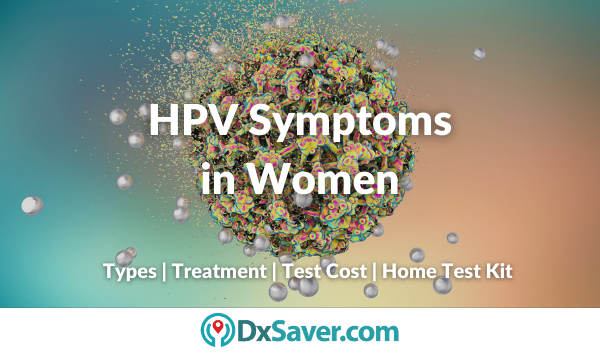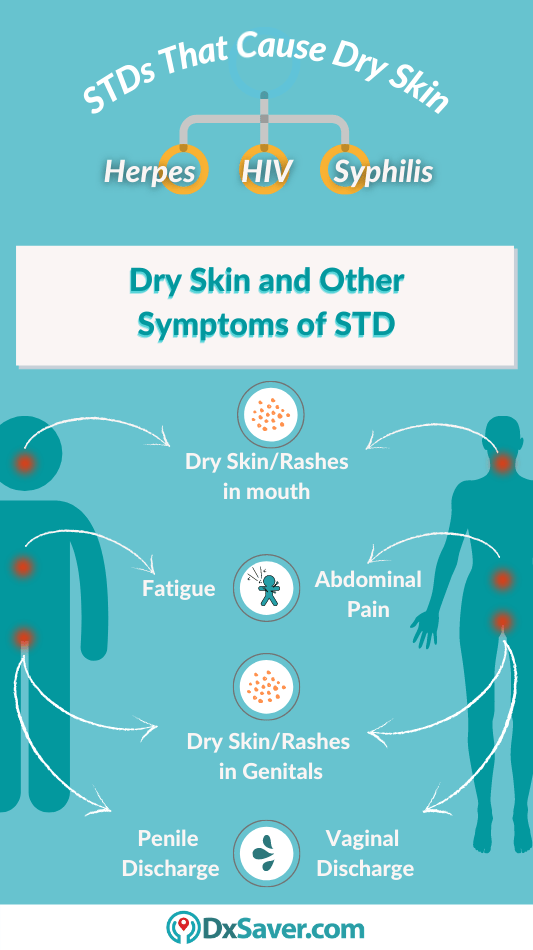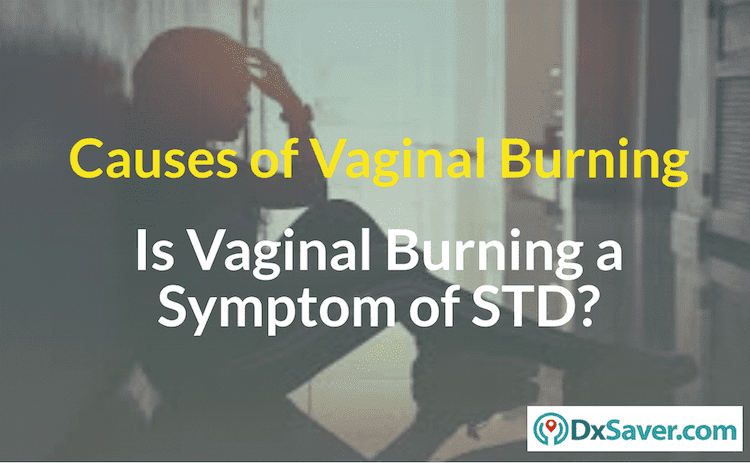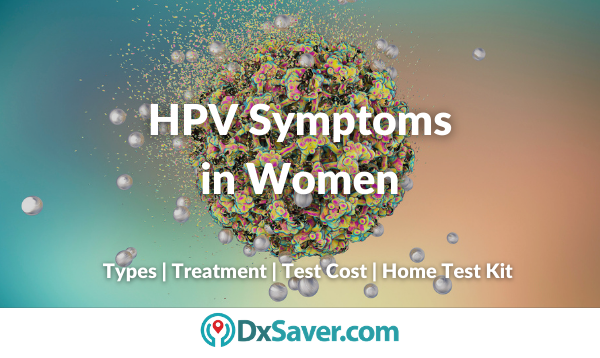
Human Papillomavirus also commonly know as HPV is the most common Sexually Transmitted Infection (STI). As the name ends in virus, you may think HPV STD is similar to HIV or Herpes which are also caused by viruses. However, HPV is caused by a different virus than HIV and HSV (herpes). According to the Centres for Disease Control and Prevention (CDC), there were about 43 million HPV infections in the year 2018 alone, and most of the cases are reported by teenagers who are in their early 20s.
Before HPV vaccines were invented, roughly 340,000 to 360,000 women and men were affected by HPV and exhibiting genital warts symptoms every year. According to a study, about one in every 100 sexually active adults in the U.S. has genital warts at any given time.
- HPV Testing Cost
- What is HPV STD?
- HPV Transmission Rate?
- HPV Symptoms in Women
- HPV Genital Warts in Female
- HPV Sores in Women
- How Often do HPV Warts Recur?
- How Long HPV warts last?
- Types of HPV
- What are the 14 High-Risk HPV Types?
- High-Risk HPV Types
- Low-Risk HPV Types
- How to Get Tested for HPV STD?
- Is there any Preparation Required Before HPV STD Testing?
- Is there an AT-Home HPV Test Kit Available?
- Is HPV Treatable?
- HPV Warts Removal
- Dating with HPV Warts
- HPV Vaccine
- Can HPV Kill You?
- Providers Locations
For our readers, who are very much interested in knowing the HPV STD test cost beforehand, we would like to begin with that section.
How much Does HPV Testing Cost Near Me?
HPV STD testing costs around $89. We have chosen the best, yet affordable STD testing and at-home test kit providers and have listed them for you. No prior appointment is required. Compare the price, order your test online and visit the nearest lab during lab business hours or shop the STD home testing kit. Complete the procedure and get the results in your email in 2 to 3 business days.
The following table shows the HPV STD home testing kit cost at one of our partner laboratories (CLIA – Certified) network located across the U.S.
Name of our Partner Labs | Book Online |
myLAB Box(Home Test Kit)
| Starting from$89 |
What is HPV STD?
HPV Transmission Rate
The Human Papillomavirus (HPV) takes advantage of the cut, scrape or tear in your skin and invades your body when you come in close skin-to-skin contact, or vaginal, anal, or oral sex. HPV is most commonly spread during sexual intercourse that includes oral sex.
Women who pregnant and have HPV can pass to their baby if they have genital warts. This can also cause a noncancerous growth in your baby’s voice box, however, this is very rare.
According to the National Institute of Health (NIH), the highest rates of HPV transmission cases are from the female anus to the male genitals (47.1 per 100 person-months of exposure), followed by the women’s cervix to the male genitals (27.8 per 100 person-months of exposure).
HPV Symptoms in Women
Initially, you may not develop any symptoms despite contracting the HPV STD, and the symptoms can be seen years after you have sex with someone who is infected. This makes it hard to know when you first became infected, especially if you are sexually active and having more than one sex partner.
If you are experiencing any symptoms like abnormal skin (warts) growths or changes in your labia, scrotal, anal, or throat areas, then get tested for HPV STD as soon as possible. As it may also be an indication of early cancerous growth.
According to the National Cervical Cancer Coalition (NCCC), more than 80% to 90% of people have reported that HPV symptoms go away without any treatment within 2 years.
In the case of persistent warts or an outbreak of HPV warts, it can lead to other problems. Some HPV types can cause symptoms like lesions, or abnormal areas on your tongue, tonsils, soft palate, or in your nose or larynx (voice box).
HPV STD, if left untreated can lead to cancer of the:
- Anus
- Genitals
- Mouth and/or upper respiratory tract
HPV warts are highly contagious – you can get them even by unknowingly touching someone else’s wart during a skin-to-skin contact like sexual intercourse.
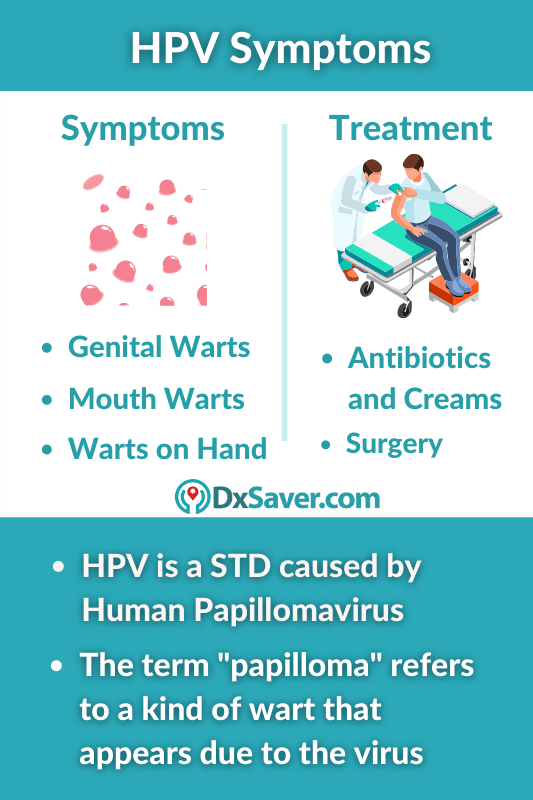
HPV Symptoms in Women: Genital Warts
HPV infection’s most commonly reported symptom is genital warts that usually appear as a small bump or group of bumps in the genital area which can be small or large, raised or flat, or shaped like a cauliflower.
An active HPV STD in women can see symptoms of warts around the following genital areas:
- Vulva
- Scrotum
- Anus
Most women notice HPV genital warts on the vulva. Sometimes near the anus, in the vagina, or on the cervix. HPV genital warts in women are typically painless but may be itchy.
HPV Symptoms in Women: Sores
Some people address HPV warts also as sores. Human Papillomavirus causes common warts, the small, white, or brown skin growths that can appear anywhere on the body. The HPV sores most commonly implant in moist mucous membranes like the mouth, anus, and genitals.
HPV Symptoms in Women: Mouth Warts
Since the mouth has a wet environment, the virus adapts well and starts to manipulate without any trouble leading to warts around the mouth. HPV STD is the leading cause of oral cavity cancers. HPV warts may also occur on the back of your throat. If you notice any abnormal skin changes in these areas, consult your doctor immediately.
Some symptoms of cancer in the oral cavity include:
- Earaches
- Hoarseness
- Persistent sore throat
- Pain when swallowing
- Swollen lymph nodes
- Unexplained weight loss
However, not all types of HPV strains lead to mouth cancer, only high-risk HPV types may develop into oropharyngeal cancer.
HPV Symptoms in Women: Warts on Lips and Face
HPV symptoms also include oral mucosal warts, also known as papilloma, appear as asymptomatic, small, soft, pink or white, slightly elevated papules and plaques on the lips, tongue, or inside the oral cavity. They grow in size over weeks to months. They also tend to form around the eyelids, HPV warts on the face are known as facial warts or filiform warts.
HPV Symptoms in Women: Warts on Hands and Neck
Women also experience HPV warts that appear as rough, red bumps usually appear on elbows, fingers, and hands. These warts may be painful or bleed easily. Besides the moist areas, HPV warts can crop up anywhere on the body.
How Long HPV Warts Last?
According to the World Health Organization (WHO), the latest research shows that HPV warts tend to persist only in 10 to 20 percent of those who contract them, whereas nearly 80 to 90 percent clear the HPV symptoms within two years of infection. However, if certain HPV strains persist over a long time, they may induce cell changes that lead to cancer.
Most people ask how long does the HPV symptoms and warts last, these factors increase the risk of the infection staying for long and not going away – sex without protection, alcohol use, smoking tobacco, and having a suppressed immune system.
How Often do HPV Warts Recur?
Even though the HPV warts temporarily disappear, the virus is still isn’t cured, thus it’s highly possible to experience recurrences of HPV warts and abnormal cervical cell growth for the rest of your life. In the case of a strong immune system, women may have one episode of HPV symptoms and never have another issue again be able to clear the infection entirely. Suppose if the immune system is weak, you may face more recurrences.
If the HPV warts are going to recur, they’ll usually reappear within the first 3 months after treatment (warts removal). However, in 70 to 80 percent of cases, there’s no recurrence within the first 6 months.
HPV reinfection in women by the same strain is said to occur more than by a different HPV strain. Especially, HPV strain 16 is a high-risk HPV type that is also responsible for most HPV-related cancers. The initial infection increases the one-year probability of reinfection 20 times (20x), and the probability of reinfection remains 14 times (14x) higher two years later.
HPV Types
There are many different types of HPV, some studies show more than 100 types of HPV. Certain HPV types can cause health problems including genital warts and sometimes may lead to cancers. However, there are vaccines that can prevent you from acquiring such high-risk HPV strains and symptoms from appearing.
Not all the HPV types are sexually transited, approximately 40 strains are sexually transmitted. All the HPV types are numbered and categorized as per their severity as either a high-risk or low-risk HPV.
What are the 14 High-Risk HPV Types?
According to the US National Library of Medicine and National Institutes of Health, the 14 types of high-risk HPV strains include types 16, 18, 31, 33, 34, 35, 39, 45, 51, 52, 56, 58, 59, 66, 68, and 70.
There are at least 12 high-risk strains of HPV, out of the dozen, only two—types 16 and 18—cause the majority of HPV-related cancers, like cervix, vagina, vulva, and anal cancer.
High-Risk HPV Types
High-risk HPVs are more aggressive forms of the HPV virus that may lead to severe health complications like cancer and required medical treatment to keep the symptoms under control.
Data from 2010 to 2014 indicates that there are nearly 41,000 HPV-related cancers in the US each year. Of these, almost 24,000 are seen among women and about 17,000 in men.
The most common types of cancers caused by HPV STD are:
- cervical, vaginal, and vulvar cancer in female
- throat and anal cancer in both the sexes
Women with high-risk HPV often encounter cervical cancer than any other type of cancer. Throat cancer is the most common HPV-related cancer seen in men.
Low-Risk HPV Types
Low-risk HPV types are types 6, 11, 42, 43, and 44. Low-risk HPVs can cause warts around the genitals, neck, hand, or anywhere on the skin. These HPV types generally produce little to no other symptoms. Warts tend to resolve on their own without any long-term effects.
How to Get Tested for HPV STD?
Firstly, you need to take an initial screening test for the HPV STDs that you suspect of having exposed to (i.e. based on the symptoms you experience like genital warts). HPV test uses a cotton swab to take a sample from the infected area such as mouth, throat, vagina, or, anus. If you are tested HPV positive, an advanced test might be required to know the exact stage of your infection and to decide the treatment options accordingly.
You’ll also be asked to take an HPV test again after a certain period of time, probably after the completion of your treatment course or removal of warts to know that you are not quite infectious in transmitting the disease.
Is there any Preparation Required Before HPV STD Testing?
There are no special preparations required before taking the HPV test for women. However, women are asked not to wipe their infection area before taking the swap sample. Other than this, you can continue with your regular diet and habits.
Is there an AT-Home HPV Test Kit Available?
If you are feeling awkward to walk into a clinic or talk to your doctor regarding your HPV symptoms, an at-home HPV STD test kit is just right for you. At-home HPV test kits are preferred by people who do not have time to make an appointment and visiting the lab.
You can order an HPV home test kit through the following button. The test kit will be delivered to your home and the package doesn’t disclose where it comes from and what it contains – we respect your privacy. All you need to do is to collect the sample as mentioned in the instructions with the oral swab collection provided in the test kit and post it back to the mentioned address. Your test results will be mailed to you within 2 to 5 business days.
If you are tested HPV positive, you can get a free online doctor consultation to help walk you through what to do next and treatment options.
Is HPV Treatable?
There is no complete cure for the HPV virus. However, there are treatments for the HPV symptoms: genital warts or cervical pre-cancer. If you suspect HPV, get screened for cervical cancer. It is highly recommended that routine screening for women aged 21 to 65 years old can prevent cervical cancer.
Avoid having sex is the only way to prevent HPV and other deadly STDs that are prevailing around. You never know who has herpes of HPV or HIV as most of the STDs do not show any symptoms and the sex partners might be spreading STDs without their knowledge.
HPV Warts Removal
Warts may go away without treatment, but if they persist for a long time, then your physician will suggest also medications to treat them, include:
- Salicylic acid: This ingredient is to be applied directly to the wart. However, using it on your face or face wart is not suggested.
- Imiquimod: Imiquimod is a cream that helps your immune system get rid of HPV.
- Podofilox: You apply this gel directly to genital warts to destroy the excess sticking-out tissue – you may experience some burning and itching from it.
If the above treatment or prescriptions doesn’t show any improvement, your physician may recommend any of the following to treat and remove the HPV warts:
- Cryotherapy – freezing with liquid nitrogen
- Electrocautery – burning with an electric current
- Surgery
- Laser surgery – using intense light to destroy warts and abnormal cells
Dating with HPV Warts
Couples, when they hear about HPV as a sexually transmitted infection (STI) on TV, make them feel worse about the matter, sometimes making them feel “dirty”. According to a survey by BBC, more than 40% of women who are sexually active said being told they had HPV STD would impact their dating/sex lives, with younger women being the most concerned. Just 22% said they would date someone or continue dating with someone having HPV and more than half would consider ending a relationship with a partner if they knew they had it.
From a healthcare perspective, it is not advisable to date or involve in sexual activity unless and until you get checked for HPV and reduce the symptoms or remove warts. There are high chances of infecting other partners or even your beloved ones.
HPV Vaccine
On June 8, 2006, the US Food and Drug Administration (FDA) approved the use of the HPV vaccine and announced it safe and effective. The HPV vaccine can protect against HPV-related cancer when given in the recommended age groups – 9 to 26 years of age is seen as the viable age group for taking the HPV vaccine.
If you are 26 years and above then, vaccination is not recommended, because this age range provides less benefit. However, if you fall between the age 27 through 45 years and not already vaccinated and suspect of risk for new HPV infections then you may get the HPV vaccine after speaking with your healthcare provider.
Can HPV Kill You?
HPV STD is not always fatal or leads to death. However, this can be said only if the disease is addressed at an early stage. If your immune system is weak or having HIV/AIDS then fighting off the HPV virus is very unlikely.
HPV has the potential to cause anal cancer in both men and women. The statistics and the number of cancer that affects women and men stand at 5,530 and 2,770 per year respectively. The death rates stand at 760 deaths in women and 520 in men.
HPV STD can cause cervical and other cancers including cancer of the vulva, vagina, penis, or anus. The virus can also cause cancer in the back of the throat, including the base of the tongue and tonsils (called oropharyngeal cancer).
And, talking about cancer, they often take years or even decades to develop after contracting the HPV STD. The treatment for HPV-related cancer also tends to be over a long course.
Providers Locations
HPV STD testing can be done in any of the following states either by visiting the nearest provider or by ordering the HPV STD home test kit.
- Alabama
- Alaska
- Arizona
- Arkansas
- California
- Colorado
- Connecticut
- Delaware
- Florida
- Hawaii
- Georgia
- Idaho
- Illinois
- Indiana
- Iowa
- Kansas
- Kentucky
- Louisiana
- Maine
- Michigan
- Minnesota
- Mississippi
- Missouri
- Montana
- Nebraska
- Nevada
- New Hampshire
- New Mexico
- North Carolina
- North Dakota
- Oklahoma
- Oregon
- Pennsylvania
- Puerto Rico
- South Carolina
- South Dakota
- Tennessee
- Texas
- Utah
- Vermont
- Virginia
- Washington
- West Virginia
- Wisconsin
- Wyoming
- New York
Frequently Asked Question
Will insurance cover my HPV STD testing cost?
No. Generally providers do not accept the insurance in order to ensure your privacy. However, they will provide you a receipt for insurance reimbursement purposes.
How should I book my appointment for HPV STD testing?
You can choose the most suitable provider from above and make an appointment by following the instructions mentioned by them.
Can I cancel my lab test order?
Yes, you can cancel your lab test order anytime before your testing. A refund will be initiated after deducting the cancellation fee. However, cancellation is at the discretion of the provider.
Do the providers offer result interpretations?
Yes, few providers may provide doctor consultation who will take you through the results and provide clarification if needed.
How do I receive my report?
In order to ensure your privacy, the test report will be mailed to you by the provider.
Other topics you may be interested in:-
- ESR Blood Testing Near Me in the US
- Importance of Creatinine Levels and Kidney Health
- Anti-TPO Testing Cost in the US
- STD Testing Cost in the US
- Importance of Lymphocytes in Blood
- Fertility Check: Estrogen Hormone Screening for Women
- Lyme Disease Symptoms, Causes, Diagnosis, and Treatment
- Diabetes Symptoms, Normal Levels and Testing Cost in the US
- Skin Cancer Signs, Causes, and Treatment
- Growth Hormone (GH) Levels in Children and Adults
- Symptoms of Oral Chlamydia and Testing Cost
- Prostate Cancer (PSA) Symptoms in Men and Diagnosis
- Why do Women have a Vaginal Burning Sensation?
- Thyroid Stimulating Hormone (TSH) Normal Levels, High-Level Causes, and More






